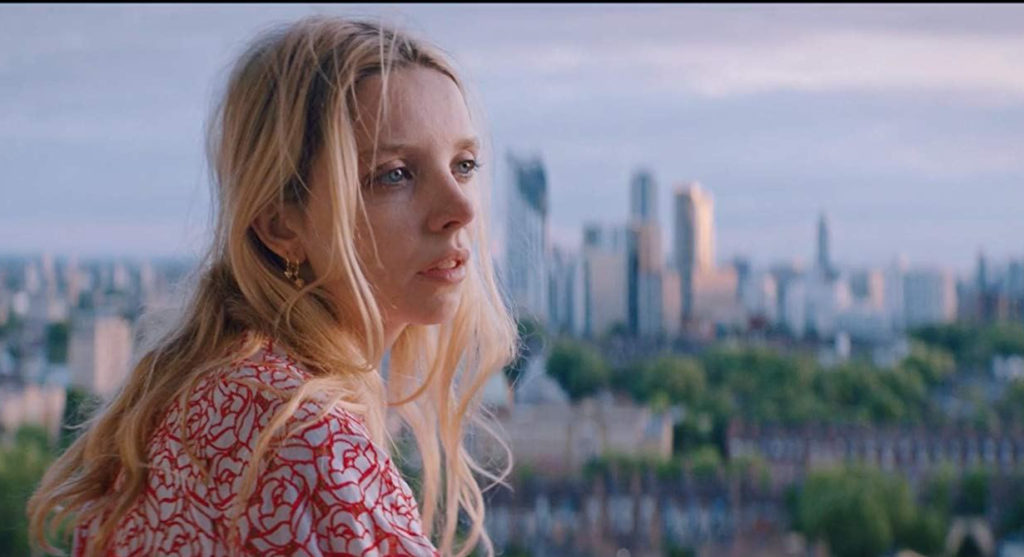Greta Bellamacina may be the British answer to Greta Gerwig. There are certainly very many similarities between Bellmacina’s debut feature Hurt by Paradise and the Gerwig vehicle, Frances Ha. Both films have at the centre of their core, a troubled young twenty-something woman trying to find her identity and purpose in the world. They explore and celebrate the complexities of female friendship.
Both films have a narrative that flows, and is mostly made up of tender, intimate and isolate scenes which could be their own self-contained short films. Bellamacina constructs her film in the form of verses which reflects her main character’s (Bellamacina stars as Celeste) desire to become a poet. Hurt by Paradise is also a film which celebrates the beauty of black and white cinematography, which helps us see the city of London in a more romantic style. And, of course, both women share the same name.
Life isn’t easy for Celeste, who faces rejection upon rejection as she tries to find a publisher for her book of poems. Which are based on her reaction to the biggest rejection of her life, by her father. Celeste spends her time going through the phone searching for her father, with little avail. Celeste is also a struggling single mother, relying on her best friend and neighbour Stella (Sadie Brown) to help her with the child caring duties.
“Hurt by Paradise is also a film which celebrates the beauty of black and white cinematography, which helps us see the city of London in a more romantic style.”
Stella also has her own struggles, she is an aspiring actress who may have passed her chance to become a star. Both women yearn to find the right man. Unknown to Celeste, Stella has found love online and declares one day that she needs paying for her babysitting duties in order to upgrade her broadband. The two women may seem from different backgrounds but their friendship seems authentic. Celeste is from a more privileged background with an artistic mother (Tania Wade) who is a little eccentric to say the least. While, we get the impression that Stella is from a working class background.
Although, Hurt by Paradise does share some striking similarities with Frances Ha it is its own film, full of life and charm. The film’s strengths not only lie in its performances, but its cinematography by Fabio Paleari and Emily-Jane Robinson, who bring the film to life. The film flickers from striking black and white to colour, and when it does switch to colour, a vibrant brightness floods the screen.
Celeste seems to believe that she is stuck in this world of black and white, with her past holding her back from embracing the life around her. There’s a tragic aspect to the character, that we can probably all relate to. Celeste seems to believe that only pain and sorrow can motivate her and fuel her creativity. Instead, we come to realise that it is the world that surrounds her in the present, with her friends, family and son being the real driving force.
“There’s a great deal of realism to this portrayal of motherhood.”
Hurt by Paradise is refreshing on so many levels. Like the wonderful Alice, this is another film which shows the power of female friendship. Both Stella and Celeste bring the best out of each other. They need each other for support even if they sometimes prefer not to confess that’s the case. The film is also effective in reflecting the struggles of a single mother. Celeste seems out of her depth, but like all good mothers, she strives to do her best to provide for her child. There’s a great deal of realism to this portrayal of motherhood, and it’s quite rare to see a mother depicted as decent, but flawed human being.
Greta Bellamacina also evokes the style of Woody Allen, with the film’s opening shots mirroring Manhattan, showing us an all too familiar city in a more poetic and romantic light. Like Allen, Bellamacina’s film has an autobiographical element to it. Bellamacina has also been a struggling poet in London. It must take a great deal of courage, to put this version of yourself on the big screen.
Bellamacina isn’t the only one, to open herself up for the world to see. Sadie Brown also delivers an impactful, and emotional performance. The scenes in which these two characters interact with each other flow, and the delivery of the dialogue never feels stilted or as if the actresses were reading from a script. The supporting cast featuring the likes of Camilla Rutherford, Anna Brewster, Jaime Winstone and Tanya Burr, all give strong performances.
“Bellamacina has it in her to become one of the great contemporary female voices in British cinema.”
Towards the end of the film, it could be argued that a certain reveal could dissastify some viewers, but it hardly matters. This film has so much charm, and appeal, that it keeps the viewer invested even when the narrative may stagger at times. Of course, if you aren’t a fan of mumblecore indie dramas/comedies then this may not be the film for you.
However, there’s no denying that Greta Bellamacina has made a great explosion onto the big screen, and it is worth keeping an eye on her next move. Certainly, Bellamacina has it in her to become one of the great contemporary female voices in British cinema. Overall, Hurt by Paradise is a charming, little film that is full of life and soul, and I simply can’t stop thinking about it.

